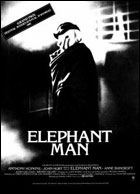Objectif
Cinema : Where did this adventure
all start from ?
Roland Kermarec : I chose
David Lynch as the theme for my Master’s in Modern Literature
when I was studying in Brest (Brittany). At first I had planned
to only concentrate on his two first films, Eraserhead
and The
Elephant Man, but my research professors suggested
I tighten the subject around a more precise theme for they
themselves were not sure of being able to guide me correctly.
It wasn't easy for them to accept the choice, for the film
department of the university is in Rennes and not Brest. And
there is no obvious link between Eraserhead and Literature !
If only yet I had chosen Dune or even Wild at Heart !
Lynch has a very difficult relationship with words. As
he shows us in his first short film, The Alphabet,
he rejects them. And if he repeats himself often in interviews,
it's because he doesn't trust words and he prefers to protect
himself by using the same speech over and over again, one
that he masters perfectly (his thoughts on ideas floating
in the air and his attraction to mysteries, etc.). Therefore,
writing an essay in modern literature on Lynch could easily
have seemed off the mark at first.
| |
 |
|
|
Objectif
Cinema : And your professors
trusted you ?
Roland Kermarec : I had met
a professor who was into theatre and another who taught a
course in film criticism. They decided to cooperate/work together,
so as to give me better guidance in my research. Contrary
to the usual method, I could not give them any kind of framework
to start off with. I didn't really know in which direction
I was going, and only had a vague idea of where it was going
to lead me. Furthermore, giving this theme a precise frame
to follow all year long might have killed all of my desire
to dive into Lynch's mysterious world.
Often, essays like this have pompous titles filled with pseudo-intellectual
theories... But since Lynch has a naive vision of the world,
a child-like hunger to discover the universe without the slightest
preconception, I wanted to stay true to this idea in my essay
and not over-intellectualize my statements, to see his films
as objectively and as open-minded as I could.
My master’s essay finally concentrated itself on Eraserhead
and on Lynch's short films (Six Men Getting Sick, The Alphabet
and The Grandmother). In my next year I immediately
decided to do an essay on The Elephant Man, this time
with more of a literary base, involving all the adaptations
of Merrick’s life, namely the work by Frederick Treves, the
surgeon played by Anthony Hopkins in the film, as well as
the deep research done on Merrick’s life by two English documentarists,
Michael Howell and Peter Ford.
On one hand, I touched on the details of the character's life,
comparing it to David Lynch's adaptation, and on the other,
I made personal interpretations based on Lynch's theory that
there are as many interpretations as there are spectators.
Insisting in this manner on my own subjectivity and never
trying to make a definite interpretation of the film.
|